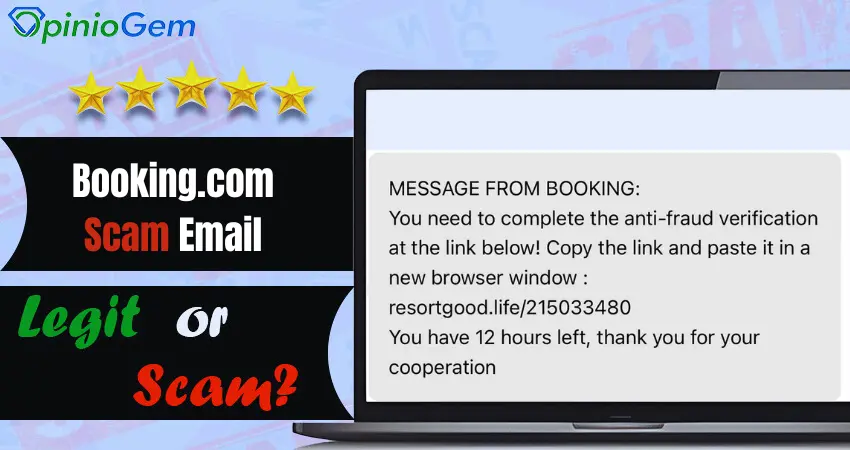Scam emails that look like they are from Booking.com are becoming more common. These emails can trick people, so it’s important to know how these scams work and how to stay safe.
How Does This Scam Work?
The scam usually starts when you get an email that looks like it’s from Booking.com, confirming your reservation or asking for more information. These emails often use Booking.com’s logos and booking details to seem real. Here’s how the scam works step-by-step:

1. Email Receipt
You get an email that looks like it’s from Booking.com, showing details of your upcoming reservation or asking you to confirm some information. The email might have links to view your booking or to enter more details.
2. Fake Links
The email includes a link that takes you to a fake website designed to look like Booking.com. This site might ask for personal information, like your login details, payment information, or other sensitive data.
3. Data Theft
When you enter your details on the fake site, the scammers steal your personal information. They can use this information to commit fraud, access your financial accounts, or sell your data on the dark web.
4. Further Exploitation
Bad links can install harmful software on your device. This lets the scammers get more of your personal information or watch what you do online.
These emails are particularly dangerous because they play on the trust and familiarity that customers have with Booking.com. They look professional and have lots of details, which can trick even careful people.
Read: How To Withdraw Hamster Kombat Coin?
How to Protect Yourself from This Scam
Staying alert and being proactive can keep you safe from these scams. Here are some important tips:
1. Verify Email Sources
Always check the sender’s email address. Booking.com emails will come from a legitimate Booking.com domain. Be wary of slight misspellings or unusual domain names.
2. Avoid Clicking Links
Instead of clicking on links in the email, go directly to Booking.com’s website by typing the address into your browser. This way, you’ll be sure you’re going to the real site.
3. Check with the Resort
If you receive a suspicious email, contact the resort directly using the contact information provided on Booking.com or their official website. Do not use any contact details provided in the suspicious email.
4. Use Two-Factor Authentication
Enable two-factor authentication (2FA) on your Booking.com account if available. This adds an extra layer of security by requiring a second form of verification.
5. Keep Software Updated
Make sure your antivirus and anti-malware software are always updated. These programs can find and stop bad things happening on your devices.
6. Educate Yourself
Stay informed about common phishing tactics and how to recognize them. Scammers often use similar strategies, and being aware of these can help you identify potential threats.
Booking.com Scam Email

Our Opinion
Scam emails from Booking.com can be distressing and potentially harmful, but with the right knowledge and precautions, you can protect yourself.
Always verify the legitimacy of the emails you receive, avoid clicking on suspicious links, and maintain good cybersecurity practices.
By being smart and careful, you can make sure your travel plans are fun and free from scams.
You should also be Aware of these types of Scam:
Is Hamster Kombat A Scam: Honest Review!


[…] Read: Booking.com Scam Email […]